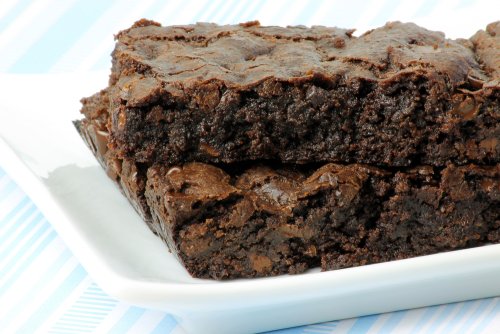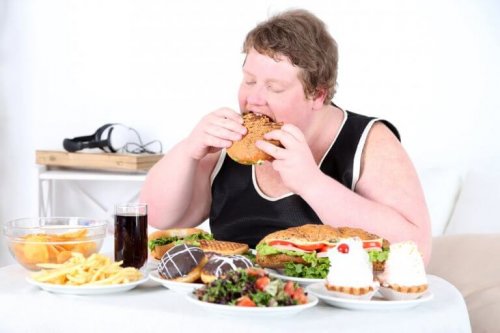The Differences Between Hunger and Anxiety


Reviewed and approved by the pedagogue in physical education and nutritionist Elisa Morales Lupayante
Do you know the differences between hunger and anxiety? Although this may seem ridiculous, the majority of us actually don’t know where one ends and the other begins.
You might like: 4 Oat Milk Smoothies to Calm Your Hunger
The feeling of hunger is an instinct regulated by your sympathetic nervous system. With the release of certain hormones, you experience this sensation, which indicates a clear necessity. Then, you have to get energy for your body in order to survive and so your body and brain can maintain homeostasis.
On the other hand, anxiety doesn’t seek to nourish the body. Instead, it serves to momentarily make up for your emotions, feelings, and worries.
It’s very important to know and understand the differences between hunger and anxiety. As a result, you’ll not only help prevent health problems such as obesity and diabetes, but also mental health problems such as eating disorders.
The Differences Between Hunger and Anxiety

The Federal University of Uberlândia in Brazil published an interesting study in 2017, which revealed some very important aspects of this topic:
- First, a big part of the population eats in order to calm their anxiety. However, we all do this occasionally. If it happens once in a while, it doesn’t mean that it will become a repeated behavior, nor does it indicate mental illness.
- Occasionally, we have cravings for foods that are either very sweet or very salty because our brain seeks satisfaction with that dose of endorphins or serotonin. It’s instant gratification and is short-lived.
- That being said, there are people who suffer from chronic anxiety that goes undetected. This type of unease finds an escape through food, especially compulsive and unhealthy eating behaviors.
Nevertheless, let’s look at some tips to help you understand the differences between hunger and anxiety.
Real Hunger Appears Gradually
The first difference between hunger and anxiety is that real hunger appears when the body needs more energy. This happens as the hours pass and your body burns calorie reserves as it performs daily activities.
Therefore, it’s important to recognize that real hunger appears gradually. You’ll get a light sensation that as time passes, which increases gradually until it affects your performance. You’ll start to feel weaker and weaker.
In order to avoid feeling this kind of extreme hunger, we recommend that you eat light meals or healthy snacks every few hours. This way, you’ll also control your weight and gradually replace the energy that your body is using.
On the other hand, anxiety provokes a sudden feeling of hunger: it’s a longing, a desire, and an empty feeling.
If you’ve experienced this mental disorder, you’ve felt the need to eat something even after finishing a meal. Even though there’s no reason you should feel hungry, you’ll feel desperate to eat something else.
Similarly, it’s common that anxiety-driven hunger increases during the night.
Anxiety-driven Hunger Leads to Cravings for Specific Foods

Another difference between hunger and anxiety is that true hunger doesn’t involve craving something specific to eat. In this case, your body is looking to obtain the energy it needs. For this reason, you should be able to eat just about anything.
On the other hand, when you’re experiencing an anxiety attack, you’ll crave foods that are high in carbohydrates. In this case, you should have a piece of fruit or healthy snack on hand so you don’t simply eat something because it looks appetizing.
During an anxiety attack, it’s pretty common to crave processed foods that contain high levels of sugars and fats, like French fries, cake, etc.
The problem with anxiety is that, once you’ve eaten these products, you can develop a kind of addiction. Then, each time you feel anxious, you’ll want to eat more and more junk food.
You might like: What Are the Main Food Intolerances?
Anxiety Will Drive You to Eat Even When You’re Full
When you’re truly hungry, you only give your body the amount of food it needs. For this reason, when you feel full, you stop eating.
However, when you’re anxious or stressed, you’ll continue eating desperately, as if you hadn’t eaten anything at all yet. As a result, your anxiety will cause you to consume more food than you really need.
If you’re regularly anxious, it’s likely that you’re overweight or obese. For this reason, it’s important that you learn to calm your problem with relaxation techniques. If you don’t, you could develop serious metabolic problems.
Compulsive Eating and Feeling Guilty

The word “guilt”refers to the emotion you have when you feel you’re at fault or responsible for something that’s wrong. Real hunger does not cause a feeling of guilt because it’s a physiological necessity. When you fulfill this need, you’re keeping your body healthy and ready to continue functioning properly.
Anxiety, on the other hand, generates guilt. This is an effect that is caused by the properties of foods high in sugar and unsaturated fat. Additionally, if you continue eating all day long, you’ll feel heavy and won’t be able to complete your daily routines and activities.
Conclusions
It’s fundamental that you know the differences between hunger and anxiety. If you don’t, you could enter a cycle in which you eat to forget your problems.
Although this could be a fast solution for forgetting what’s bothering you, remember that it’s not healthy behavior.
Fortunately, however, it’s been shown that eating foods rich in fiber, such as fruits and vegetables, can actually help reduce anxiety levels. Additionally, you need to make sure your diet is low in sugar and fat.
Think about your behavior towards food. If you realize that you’re eating due to anxiety, seek a professional to help you turn it around.
There are psychotherapies that are very effective for treating anxiety and eating disorders, however mild they may seem. Healthy behavior with food means eating when you’re truly hungry and not eating to solve your problems.
All cited sources were thoroughly reviewed by our team to ensure their quality, reliability, currency, and validity. The bibliography of this article was considered reliable and of academic or scientific accuracy.
- Cecilia SIlva AAS., Cardoso Lopes TV., Teixeira KR., Amaral Mendes J., et al., The association between anxiety, hunger, the enjoyment of eating foods and the satiety after food intake in individuals working a night shift comparted with after taking a nocturnal sleep: a prospective and observational study. Appetite, 2017. 108: 255-262.
- Klatzkin RR., Gaffney S., Cyrus K., Bigus E., et al., Biol Psychol, 2018. 131: 96-106.
- Murphy M., Mercer JG., Diet regulated anxiety. Int J Endocrinol, 2013.
This text is provided for informational purposes only and does not replace consultation with a professional. If in doubt, consult your specialist.








